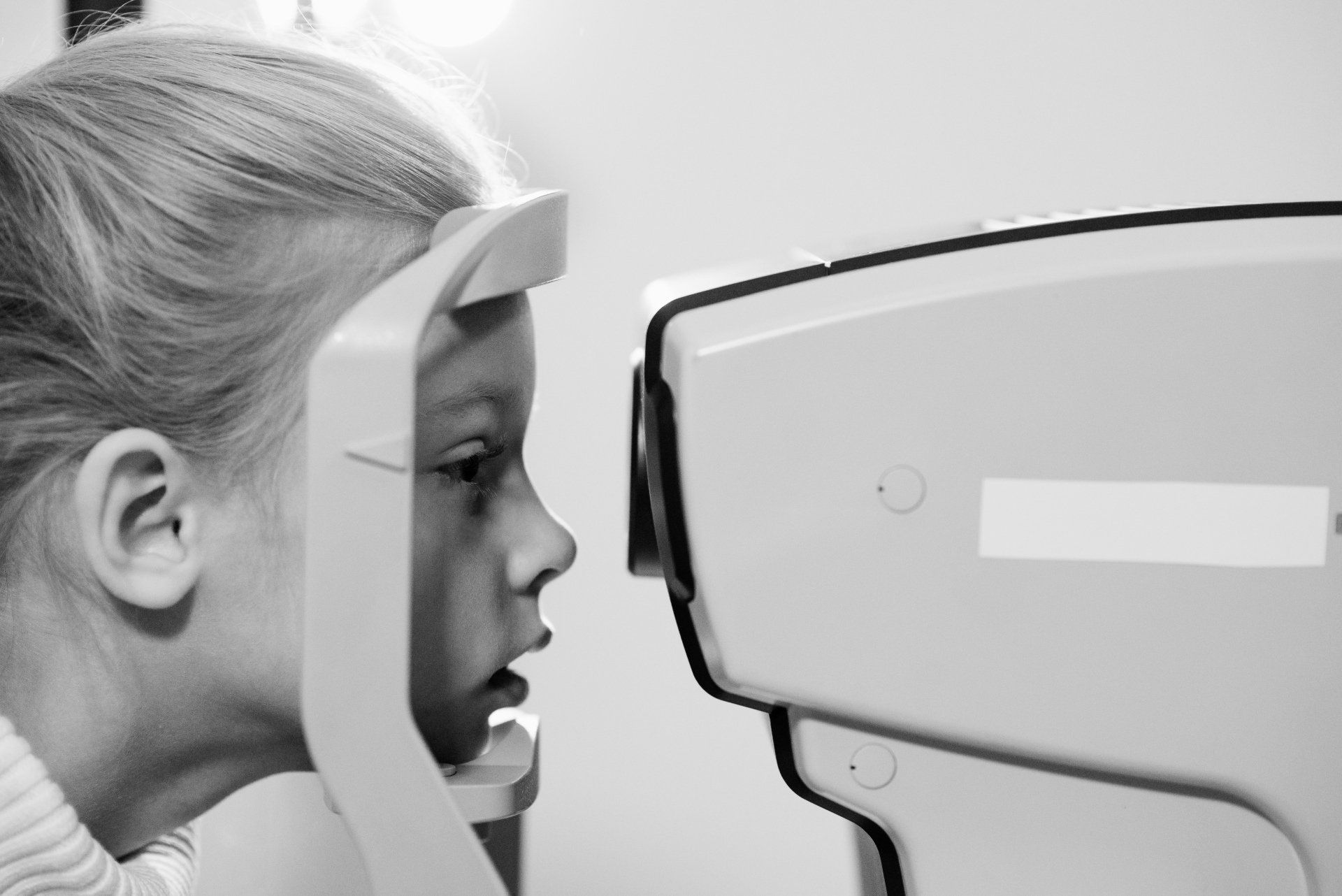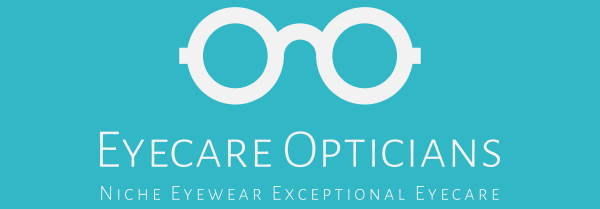Clinical Management Methods for Myopia in Children
Key Takeaways
- Myopia in children is increasing globally and can lead to severe eye conditions if not managed properly.
- Early detection and regular eye exams are essential for effective myopia management in children.
- There are several effective methods to manage myopia, including specialized spectacles, contact lenses, orthokeratology, red light therapy, and pharmacological interventions.
- Eyecare Opticians utilize advanced diagnostic tests to tailor myopia management to each child's needs.
- Lifestyle changes, such as increased outdoor time, can also play a role in managing myopia progression.
What is Myopia in Children?
Myopia in children is a common refractive error where distant objects appear blurry while close ones are seen clearly. This condition occurs when the eyeball is too long relative to the focusing power of the cornea and lens, causing light rays to focus at a point in front of the retina instead of directly on its surface.
This condition is often identified when children struggle to see the board at school or have difficulty with distant objects. This is not just a minor inconvenience - it's a condition that requires attention and management to prevent further complications.
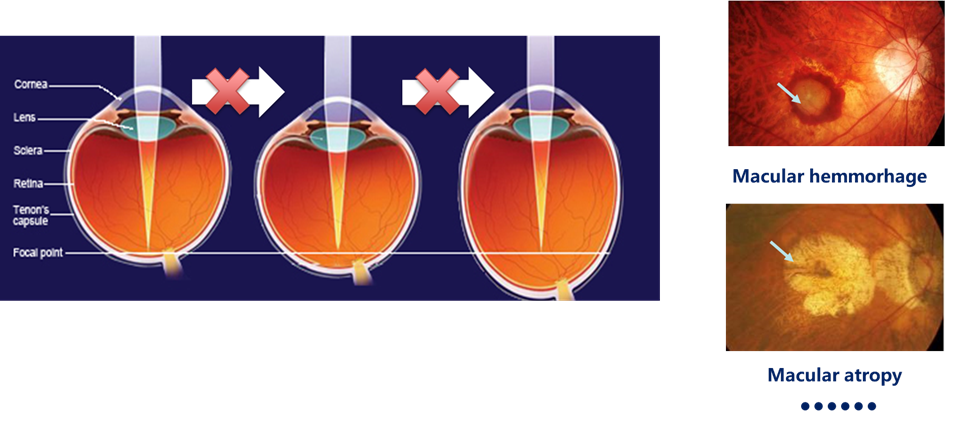
Causes of Myopia in Children
Several factors contribute to the development of myopia in children. Genetics play a role; if a child's parents are myopic, the likelihood of the child developing myopia increases.
Besides that, environmental factors such as prolonged near work, limited time spent outdoors, and certain lifestyle habits like following a diet that is lacking in eye-healthy nutrients like vitamins C and E, zinc, and omega-3 fatty acids can influence the onset and progression of myopia.
Importance of Managing Myopia to Prevent Long-Term Complications
Managing myopia is essential to prevent potential long-term eye health issues. High levels of myopia can lead to conditions like glaucoma, retinal detachment, and macular degeneration later in life.
Therefore, it's vital to address myopia as early as possible.
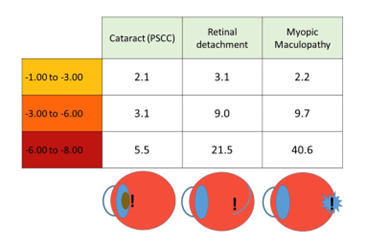
Eyecare Opticians: Your Local Vision Care Experts
Discover quality vision care at Eyecare Opticians in Ham, Kingston Upon Thames.
Led by Consultant Optometrist Nish, with over two decades of diverse optometric experience, we offer cutting-edge eye care solutions tailored to your needs.
Our services include advanced diagnostic tests like Retinal Photography Optomap and Optical Coherence Tomography, alongside specialized treatments for Myopia control and Dry Eyes. Rated 4.9 stars on Google, we're committed to exceeding patient expectations with the latest equipment and personalized care.
Schedule your comprehensive eye exam today!
Clinical Management Methods of Myopia in Children
The good news is that we have several clinical methods to manage myopia in children effectively. These methods are designed to slow down the progression of myopia, thus reducing the risks of developing more severe eye conditions in the future.
1. Spectacles
One of the first lines of defense against myopia progression in children is the use of specialized spectacle lenses - expertly designed to manage myopia.
Standard Single Vision Lenses
While standard single-vision lenses correct the current level of myopia, they do not address its progression. These lenses are typically prescribed for clear-distance vision but do not offer any myopia control benefits.
In fact, single vision correction of myopia can lead to peripheral hyperopic defocus, potentially driving axial growth of the eye.
- Effectiveness: Under-correction was once thought to slow myopia progression, but evidence shows it offers no benefit and may even accelerate progression. Therefore, regular eye exams to ensure full correction for myopes are recommended.
Hoya Miyosmart
Hoya Miyosmart lenses are an innovative solution that utilizes a technology called D.I.M.S. (Defocus Incorporated Multiple Segments).
These lenses have a central optical zone for clear vision and multiple defocus segments throughout the lens, which have been shown to slow the progression of myopia in children.
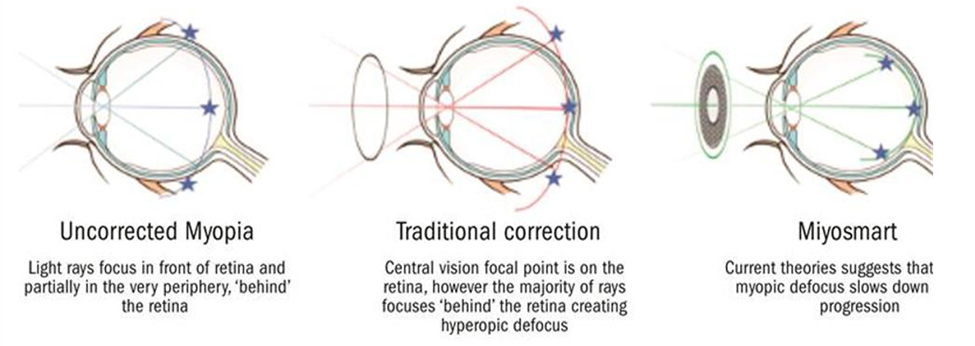
- Effectiveness: Myopia progression measured by refraction slowed by 59%, and axial length growth reduced by 60% compared to single vision lenses.
Essilor Stellest
Essilor Stellest lenses are another advanced option, employing the 'H.A.L.T. technology,' which creates a volume of signal that guides the eye towards less elongation, thus slowing down the progression of myopia.
These lenses are crafted to provide clear vision and myopia control simultaneously.
- Effectiveness: It showed a 67% refractive and 60% axial length control effect compared to single-vision lenses.
2. Contact Lenses
Beyond glasses, contact lenses have been developed with myopia management in mind. Unlike traditional contacts, these lenses utilize innovative designs to change the way light focuses on the retina. They can even reshape the cornea and control the elongation of the eye.
CooperVision's MiSight®
These are soft contact lenses that correct vision and have been clinically proven to slow the progression of myopia in children. They work by creating a 'myopic defocus' that signals the eye to grow in a manner that slows down myopia progression.
CooperVision's MiSight® are:
- First FDA-approved contact lens to slow the progression of myopia in children aged 8-12 years old.
- Utilizes a dual-focus design that allows for clear vision while also focusing light in a way that controls eye growth.
- Soft, daily disposable lenses, which means they're convenient and maintain high levels of hygiene.
- Proven to reduce the progression of myopia in children during clinical trials.
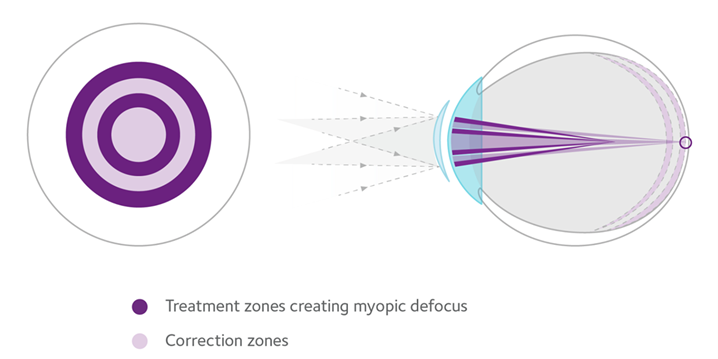
Adapting to contact lenses can take some time, and it's crucial for children to have proper guidance and support throughout this process.
Our team is dedicated to providing comprehensive training on lens use and care, ensuring that your child feels confident and comfortable with their new lenses.
- Effectiveness: 59% reduction in refractive progression and 52% less axial length growth over three years compared to single vision lenses.
3. Orthokeratology (Ortho-K or Eyedream)
Orthokeratology, often known as Ortho-K or Eyedream, is a revolutionary non-surgical procedure that uses specially designed contact lenses to temporarily reshape the cornea and reduce myopia.
Worn overnight, these lenses gently mold the cornea's surface, providing clear vision during the day without the need for glasses or contact lenses.
Benefits and Considerations of Ortho-K
- Provides clear daytime vision without the need for glasses or contacts.
- Non-surgical and reversible, offering a safe alternative to permanent vision correction methods.
- May slow down the progression of myopia in children.
- Requires consistent nightly wear for ongoing effectiveness.
Ortho-K lenses are particularly appealing for children who participate in sports or other activities where glasses and contacts might be a hindrance. The fact that these lenses are only worn at night means that the risk of eye infections associated with daytime contact lens wear is minimized.
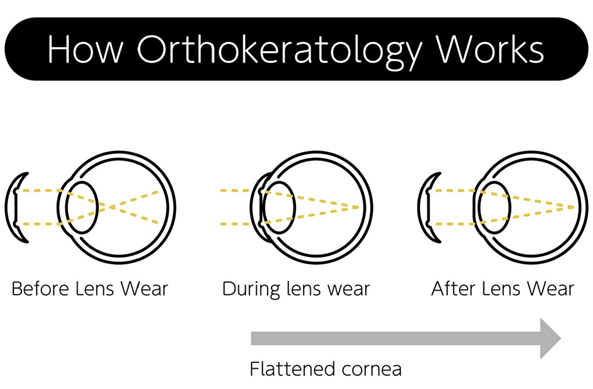
- Effectiveness: Clinical trials show about 50% efficacy in slowing myopia progression. But real-world effectiveness may be higher, with significant reduction in progression noted in individual cases.
4. Repeated Low-Level Red Light Therapy
Red light therapy is an emerging myopia management strategy gaining attention for its non-invasive nature and ease of use.
The Eyerising Myopia Management Device, for example, uses specific wavelengths of low-level red light to potentially influence eye growth and myopia progression.
The premise of red light therapy is that certain wavelengths of light can have bioactive effects on the tissues of the eye. Specifically, it's thought that low-level red light could stimulate the release of dopamine in the retina, which is known to play a role in eye growth and myopia development.
- Effectiveness: Up to 87.7% efficacy in controlling refraction and 76.6% in axial length compared to single-vision glasses. Significant axial length shortening was observed in a substantial proportion of children.
5. Pharmacological Intervention
In some cases, pharmacological interventions may be recommended as part of a comprehensive myopia management plan. These are typically reserved for cases where myopia is progressing rapidly or other methods have not been effective.
Atropine eye drops, particularly in low doses such as 0.01%, have been studied extensively for their ability to slow the progression of myopia. The drops are believed to dilate the pupils and relax the eye's focusing mechanism; hence, reducing the stress that contributes to eyeball elongation.
Low-dose atropine is often considered a safe and effective option for myopia management. Its use requires close monitoring by an eye care professional to ensure optimal dosing and to monitor for any potential side effects like stinging sensation, sensitivity to bright light, eye redness, and others.
- Effectiveness: Low doses (0.01%-0.05%) have shown to be clinically useful and safe in slowing myopia progression, but the optimal dosage and treatment duration are yet to be established. It is also not licensed for myopia control in the UK.
Choose Eyecare Opticians for Myopia Control
At Eyecare Opticians, we understand the significance of personalized myopia management. With our expertise and advanced diagnostic tools, we are dedicated to providing the highest standard of care for your child's vision.
We tailor our approach to each child's needs, ensuring that we correct their current vision and control the progression of myopia.
How Eyecare Opticians Measure the Axial Length
One of the critical factors in managing myopia is measuring the axial length of the eye. We use state-of-the-art equipment to accurately measure the length of the eye. This measurement is crucial as it helps us track the progression of myopia and the effectiveness of the treatment plan.
- We perform a detailed assessment of your child's eyes, including the measurement of the axial length.
- Our advanced diagnostic tools, such as the Optopol Revo, provide precise measurements, allowing for tailored treatment plans.
- Regular monitoring of the axial length helps us make informed decisions about adjustments to the management strategy.
Understanding the axial length also enables us to compare your child's measurements against age-matched norms. This comparison is vital because it helps us determine how your child's myopia is progressing relative to their peers. Our goal is to ensure that we are proactive in our approach, taking the necessary steps to manage myopia effectively.
Contact us to learn more about how to manage your child’s myopia.
Frequently Asked Questions (FAQ)
What Are the Signs That My Child Might Be Developing Myopia?
As a parent, you might notice certain signs that suggest your child could be developing myopia. These can include:
- Squinting or closing one eye to see clearly.
- Difficulty seeing the board at school or objects at a distance.
- Sitting closer to the television or holding books and devices close to their face.
- Complaining of headaches or eye strain.
If you observe any of these signs, it's important to schedule an eye examination for your child. Early detection is key to effective myopia management.
At What Age Should Myopia Management Start?
Myopia can develop at any age, but it's most commonly diagnosed in children between the ages of 6 and 14. Myopia management should start as soon as myopia is detected. The earlier we begin, the more we can do to slow its progression and reduce the risk of high myopia later in life.
How Often Should My Child's Eyes Be Examined for Myopia?
We recommend that children have their eyes examined annually or as advised by their eye care professional. Regular eye exams are essential for monitoring myopia progression and making timely adjustments to the management plan.
For children undergoing myopia management, more frequent visits may be necessary to ensure the treatment is effective and to make any necessary changes promptly.
What Are the Long-Term Effects of Myopia if Left Untreated?
Myopia can lead to serious eye conditions in the future if it's not managed properly. These can include:
- Increased risk of retinal detachment.
- Glaucoma, which can lead to vision loss.
- Myopic maculopathy, a condition that affects central vision.
- Cataracts that can develop at a younger age.
Therefore, managing myopia is not just about clear vision today; it's about preventing these potential complications tomorrow.
Are There Lifestyle Changes That Can Help Manage Myopia?
Besides clinical treatments, lifestyle changes can also help manage myopia progression. These include:
- Increase outdoor activities to 120 minutes per day
- Reduce near work and screen time
- Take frequent breaks using the 20–20–20 rule
- Use ambient indoor lighting
- Maximize natural lighting
- Maintain adequate posture and proper reading distance (25 inches, or an arm's length from the computer screen) while doing near work.
What Advanced Diagnostic Eye Exams are Available at Eyecare Opticians?
Eyecare Opticians in Ham, Kingston Upon Thames, offers advanced diagnostic tests such as Retinal Photography Optomap and Optical Coherence Tomography.
These cutting-edge technologies allow for detailed imaging of the eye, helping in the early detection and management of various eye conditions.

